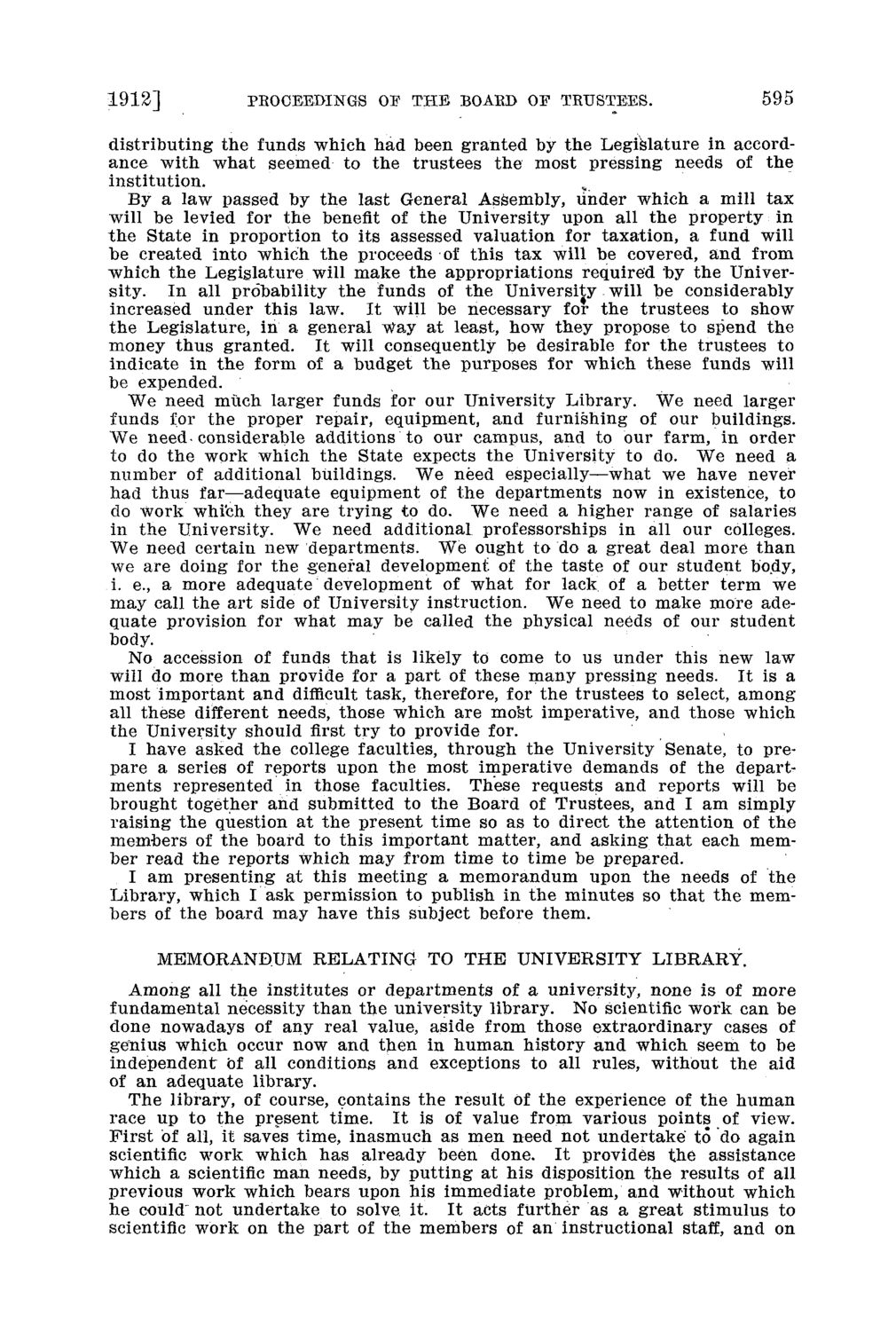| |
| |
Caption: Board of Trustees Minutes - 1912
This is a reduced-resolution page image for fast online browsing.

EXTRACTED TEXT FROM PAGE:
1912] PROCEEDINGS OF THE BOARD OF TRUSTEES. 595 distributing the funds which had been granted by the Legislature in accordance with what seemed to the trustees the most pressing needs of the institution. By a law passed by the last General Assembly, under which a mill tax will be levied for the benefit of the University upon all the property in the State in proportion to its assessed valuation for taxation, a fund will be created into which the proceeds of this tax will be covered, and from which the Legislature will make the appropriations required by the University. In all probability the funds of the University will be considerably increased under this law. It will be necessary for the trustees to show the Legislature, in a general Way at least, how they propose to spend the money thus granted. It will consequently be desirable for the trustees to indicate in the form of a budget the purposes for which these funds will be expended. We need much larger funds for our University Library. We need larger funds for the proper repair, equipment, and furnishing of our buildings. We need considerable additions to our campus, and to our farm, in order to do the work which the State expects the University to do. We need a number of additional buildings. We need especially—what we have never had thus far—adequate equipment of the departments now in existence, to do work which they are trying to do. We need a higher range of salaries in the University. We need additional professorships in all our colleges. We need certain new departments. We ought to do a great deal more than we are doing for the general development of the taste of our student body, i. e., a more adequate development of what for lack of a better term we may call the art side of University instruction. We need to make more adequate provision for what may be called the physical needs of our student body. No accession of funds that is likely to come to us under this new law will do more than provide for a part of these many pressing needs. It is a most important and difficult task, therefore, for the trustees to select, among all these different needs, those which are most imperative, and those which the University should first try to provide for. I have asked the college faculties, through the University Senate, to prepare a series of reports upon the most imperative demands of the departments represented in those faculties. These requests and reports will be brought together and submitted to the Board of Trustees, and I am simply raising the question at the present time so as to direct the attention of the members of the board to this important matter, and asking that each member read the reports which may from time to time be prepared. I am presenting at this meeting a memorandum upon the needs of the Library, which I ask permission to publish in the minutes so that the members of the board may have this subject before them. MEMORANDUM RELATING TO THE UNIVERSITY LIBRARY. Among all the institutes or departments of a university, none is of more fundamental necessity than the university library. No scientific work can be done nowadays of any real value, aside from those extraordinary cases of getiius which occur now and then in human history and which seem to be independent of all conditions and exceptions to all rules, without the aid of an adequate library. The library, of course, contains the result of the experience of the human race up to the present time. It is of value from various points of view. First of all, it saves time, inasmuch as men need not undertake to do again scientific work which has already been done. It provides the assistance which a scientific man needs, by putting at his disposition the results of all previous work which bears upon his immediate problem, and without which he could" not undertake to solve it. It acts further as a great stimulus to scientific work on the part of the members of an instructional staff, and on
| |